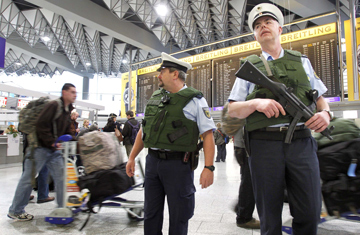
German federal police officers patrol a departure terminal at Frankfurt's international airport, Nov. 17, 2010
Germany was already on high alert for a terrorist attack when authorities announced on Thursday that a suspicious piece of luggage had been found on a Munich-bound flight in Namibia — sparking fears that al-Qaeda operatives are getting one step closer to staging a bombing campaign that would hit Germans at home. Germany's Federal Crime Office, or the BKA, revealed that Namibian police had come across the luggage — which contained batteries attached by wires to a fuse and a running clock — during the loading of a plane at the airport in the Namibian capital of Windhoek on Wednesday. Interior Minister Thomas de Maizière confirmed the discovery, telling reporters on Thursday, "The luggage was to be transported onto a plane which was to fly to Munich." It's still not clear whether the luggage contained explosives, and there are reports in the German media that it might have been part of a security test. But for an already nervous nation, the incident feels like a promise of tragedy to come.
Germany has been on edge after authorities issued a new terrorist warning on Wednesday. Citing intelligence sources, they said Islamic extremists were planning an attack on German soil within the next few weeks. And for the first time, the government conceded that there was a "concrete" threat of attack. "According to a tip provided by a foreign partner, which we received after the Yemen [cargo plot] incident, we suspect an attack is being planned for late November," de Maizière told a hastily arranged news conference. "We now have further relevant information, which the security authorities agree on, indicating that we are currently facing a new threat situation." While he didn't reveal details of the plot, the Interior Minister said there was "cause for concern but no grounds for hysteria," and urged Germans to be on their guard. Given the mounting fears of an imminent attack, the government is beefing up security at airports, railway stations and other landmarks.
The new terrorist warning is in stark contrast to previous security alerts — in the past, the Interior Minister has played down the threat. Even after U.S. and British authorities issued travel alerts at the beginning of October, advising people going to Europe to be vigilant about possible terrorist attacks, de Maizière put a lid on the feverish speculation, insisting there was only a "high level of abstract threat" and there was no need for "alarmism."
So why have officials issued a new heightened alert? A senior German intelligence official tells TIME that German security agencies have been receiving a steady stream of intelligence reports pointing to a major attack ever since a series of videos threatening terrorism acts against Germany were released ahead of last year's federal election. But those intelligence reports have multiplied and gotten "louder" in recent weeks, and the warnings have become far more specific over the past few days. "We are pretty sure that there is a great danger, and an attack is imminent in Germany," says the high-level intelligence official, also confirming that late November was mentioned by one source as a possible date for the deadly attack.
Most of the reports are believed to come from foreign intelligence agencies — especially U.S. intelligence services — and German authorities are said to have detailed descriptions of the Islamic extremists involved in the new plot. "There isn't any concrete target, but we know who these militants are," says the intelligence official, adding that a German security agency has collected its own information in recent days, which suggests a "Mumbai-style" unit is on its way to Germany to launch a series of coordinated attacks.
For several years, German intelligence officials have been monitoring the movements of some 200 German Islamic extremists who have received training at terrorist camps in the Afghanistan-Pakistan border region — at least 50 to 100 of them are believed to be back in Germany. And authorities are also trying to track terrorist sleeper cells, militants leading normal lives who have fallen under the radar of counterterrorism officials. "Germany is vulnerable to attack — it's involved in the international alliance against terror," says Rolf Tophoven, director of the Essen-based Institute of Terrorism Research and Security Policy. "It's hard to keep up with the comings and goings of German Islamic extremists — you only need one militant to mount a deadly attack."
Up until now, Germany has escaped an al-Qaeda–inspired terrorist attack, with authorities having foiled two major terrorism plots in recent years: the homemade bombs placed on commuter trains heading out of Cologne in July 2006 and the Sauerland terrorist cell, which was busted in September 2007 just as the radical Islamists were planning a series of car bombings in Germany. Those militants were thwarted, but the new terrorist warning is a chilling reminder that other jihadists have replaced them and the danger of attack is getting closer. De Maizière bullishly declared on Thursday, "International terrorism wants to spread fear and horror in our country. We won't let that happen." As armed police wearing bulletproof vests patrol Germany's airports and train stations, Germans will be hoping he can keep his promise.
